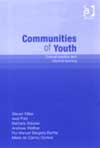Secondary learning effects
 Contrary to many training schemes, performing arts offer young women and men the opportunity to present themselves from a less „problem-oriented“ side: in fact not as an „early school-leaver“ or „under-achiever“, but as a musician, an actor/actress and so on.
Contrary to many training schemes, performing arts offer young women and men the opportunity to present themselves from a less „problem-oriented“ side: in fact not as an „early school-leaver“ or „under-achiever“, but as a musician, an actor/actress and so on.
Before this background, this research project aimed at learning more about the special learning processes happening in performing arts projects for „disadvantaged“ young people which for working purposes we had „Secondary learning effects…“
Research questions and design:
Which active role do young people play in performing arts projects? Which learning potentials do these projects have with regard to the young people’s transitions to adulthood? These questions were explored in three case studies on projects working with young people who are not reached by mainstream education measures any longer: „Hope Street“ in Liverpool/UK, „JUST“ in Mannheim/DEand „Chapito“, Lisbon/Portugal.
The research design emphasized the active role of the young people by giving them space to develop their own view on their transitions in a self-produced video, biographical interviews and focus groups.
Project partners:
- CIES, Centro de Investigacao e Estudios de Sociologia, Rui Banha, Maria do Carmo Gomes, Ana Micaela Gaspar
- University of Plymouth, Department of Sociology, Steven Miles
Coordination:
IRIS e.V., Institut für Regionale Innovation und Sozialforschung, Hechingen/Tübingen, Dr. Barbara Stauber, Axel Pohl, Dr. Andreas Walther
Duration:
1997-2000
Funding:
Own funds, EU-Programme „Youth for Europe“ (Contract no. 17/96-E.II-DE-97044)
Contact: Barbara Stauber, Andreas Walther, Axel Pohl
